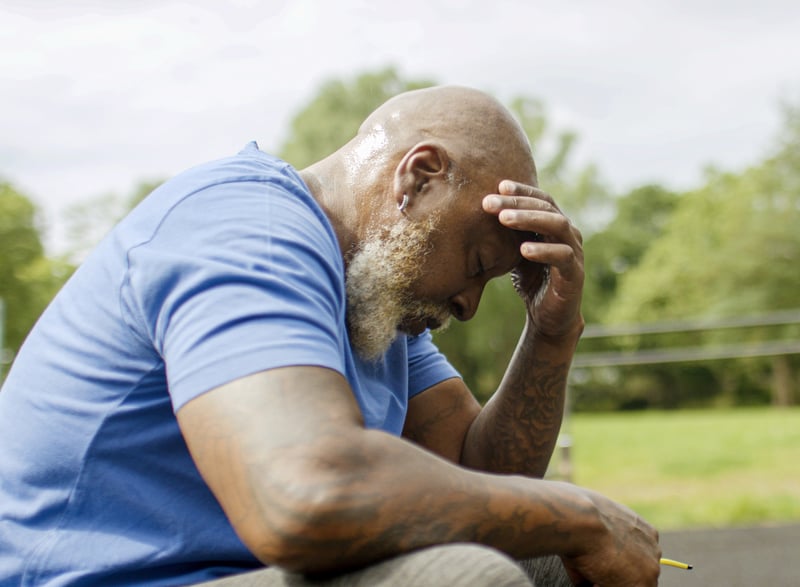Patient Resources
Get Healthy!
Extreme Heat Taxes the Brain, and Some Face Higher Risks
- August 24, 2023
- Amy Norton
- HealthDay Reporter

With 2023 predicted to be the hottest year on record, a new study is pointing to another potential consequence of heat waves: faster declines in older adults' memory and thinking skills.
The study, of nearly 9,500 older U.S. adults, found that those with greater exposure to heat waves over 12 years also showed a steeper decline in cognitive function -- critical mental skills like memory, reasoning and judgment.
The connection was specifically seen among older Black Americans and those living in poorer neighborhoods -- groups who typically have fewer resources to protect themselves from scorching summer heat.
Experts stressed that the findings show only an association between heat and cognitive decline, and cannot pin the blame on temperature extremes.
Cognitive decline is complex and influenced by many factors, said lead researcher Eunyoung Choi, a postdoctoral associate at NYU School of Global Public Health in New York City.
"Isolating the specific effect of extreme heat from this complex web is a challenging task," she said.
At the same time, there are reasons that repeated exposure to heat waves could affect older adults' mental acuity, according to Choi.
For one, there could be direct effects: Extreme heat can dull mental performance in the short term, and continued exposure over time might promote inflammation and damage brain cells.
Sizzling temperatures could also act in indirect ways, Choi said. She pointed to the well-known link between heart health and brain health.
Certain cardiovascular and metabolic conditions, including high blood pressure, diabetes and heart disease, are tied to a heightened risk of cognitive impairment -- possibly because they impede blood flow to the brain. Extreme heat might make those conditions worse.
Beyond that, Choi said, oppressive heat makes it hard to sleep or leave the house for exercise or social activities -- all of which can take a toll on older adults' cognition.
Why would low-income and Black Americans be more affected? Choi said there might be a role for "cognitive reserve" -- the brain's capacity to adapt and preserve function even as age or disease start to change the brain tissue itself.
People who are disadvantaged -- facing chronic stress and fewer educational and work opportunities, for example -- may start off at a lower cognitive reserve and see it erode faster over time, Choi said.
And that, she added, may make them more vulnerable to any added stressors, like extreme heat.
All of those scenarios are plausible, agreed Kristina Dahl, principal climate scientist with the nonprofit Union of Concerned Scientists.
"I think this study is very interesting," said Dahl, who was not involved in the research.
She said scientists know something about the acute effects of extreme heat on cognition. And many people, she noted, have experienced "that sluggish feeling in the brain" that can come with summer heat waves.
The new study, Dahl said, begins to connect cumulative heat exposure to longer-term cognitive decline.
Like Choi, though, she cautioned that it's difficult to disentangle the effects of extreme heat from other things going on in people's lives.
"I'd like to see more studies like this," Dahl said. "One study is thought-provoking, but we need more than one to better understand what's going on."
The findings -- recently published in the Journal of Epidemiology and Community Health -- are based on 9,448 U.S. adults age 50 and up who took cognitive tests repeatedly over 12 years. The researchers used temperature data from a government database to estimate participants' long-term exposure to heat waves.
Overall, 17% of participants were considered to have high exposure -- facing extreme heat for at least two weeks a year, on average.
Choi's team found that heat exposure was not related to older adults' cognitive scores at the outset.
But the picture was different when they looked at people's trajectories over time: High exposure to extreme heat was linked to a faster decline in cognitive scores -- specifically among Black older adults and those living in disadvantaged neighborhoods (regardless of race).
Among Black participants, those with high exposure to extreme heat were projected to have a 42% decline in cognitive scores between the ages of 65 and 85. That compared with a 32% decrease among Black adults with less heat exposure.
Similarly, people in poorer neighborhoods with high exposure to extreme heat had a projected decline of 37%, versus 29% among low-income people with less heat exposure.
While there are plenty of questions for future studies, Dahl said now is the time to protect vulnerable Americans from extreme heat.
That, she said, can include ensuring that people in low-income areas have easy access to cooling centers; barring utilities from shutting off people's electricity due to unpaid bills, and making sure outdoor workers have enough shade, water and rest.
More information
The U.S. Centers for Disease Control and Prevention has more on the health effects of temperature extremes.
SOURCES: Eunyoung Choi, PhD, postdoctoral associate, NYU School of Global Public Health, New York City; Kristina Dahl, PhD, principal climate scientist, Union of Concerned Scientists, Cambridge, Mass.; Journal of Epidemiology and Community Health, Aug. 4, 2023, online

